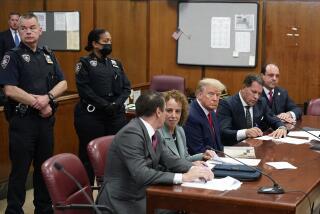President Urges Soviets to Show ‘Flexibility’ in Talks
President Reagan urged Soviet leaders Saturday to show “seriousness and flexibility” in the approaching summit conference, but he cautioned that “we must not raise false hopes” about the prospects for progress in U.S.-Soviet relations.
The President, entering a period of intense diplomatic activity and preparations leading up to his meetings with the new Kremlin leader, Mikhail S. Gorbachev, said, “We will make clear to the Soviet leaders that we are determined to protect Western interests but willing at the same time to do our part to improve American-Soviet relations.”
Reagan made his remarks in his weekly radio address to the nation. He spoke from Camp David, Md., where he is spending the weekend.
‘Keep It From Spreading’
He said that in his meetings this week and next with President Hosni Mubarak of Egypt and King Hussein of Jordan, he will discuss the five-year-old war between Iran and Iraq. Apparently despairing of bringing the war to a close, Reagan said: “If we cannot end the fighting, we and close friends like Egypt and Jordan can keep it from spreading. In particular, we are determined to preserve the free shipment of oil through the Persian Gulf.”
In their efforts to upset each others’ oil-based economies, the two warring nations have carried their battles to oil installations bordering the gulf and to other nations’ oil-carrying ships in the gulf.
On Friday, Reagan will meet for the first time with Eduard A. Shevardnadze, the new Soviet foreign minister. Reagan said they will discuss human rights, U.S.-Soviet trade and “our efforts to achieve genuine, verifiable reductions in nuclear arms.”
Hopes to ‘Bear Fruit’
In addition, he said, referring to his hopes for the scheduled conference with Gorbachev on Nov. 19 and 20 in Geneva, “I will tell Mr. Shevardnadze how genuinely we wish this meeting to bear fruit.”
The session with the Soviet foreign minister at the White House will be Reagan’s second with a senior Soviet official since he took office nearly five years ago. One year ago, he met with Shevardnadze’s predecessor, Andrei A. Gromyko. On Wednesday, Shevardnadze will confer with Secretary of State George P. Shultz in New York.
In preliminary public sparring, as well as in the arms control talks now under way in Geneva, Reagan Administration and Soviet officials have turned their attention to the role of the Administration’s Strategic Defense Initiative--or “Star Wars,” as the effort to develop a space-based missile defense system is known. But on Saturday, Reagan did not mention this point of contention.
The Soviets have proposed cutting their arsenal of nuclear weapons in exchange for a termination of Strategic Defense Initiative research.
Limits Harsh Rhetoric
Reagan used none of the harsh rhetoric he has employed in past characterizations of the Soviet Union, but he did not avoid sharp criticism.
“The Soviet Union frequently has been bent upon expansion,” he said. “Indeed, since the 1970s, the Soviet Union has been engaged in a military buildup which far exceeds any rational definition of its defensive needs.
“These policies have inflicted bitter costs upon the Soviet peoples. Every week, Russian soldiers are dying in Afghanistan while their standard of living has suffered accordingly,” the President said.
‘Can Change This’
He added: “Mr. Gorbachev can change this. He can set in train a policy of arms reductions and lasting peace. By shifting resources from armaments to people, he can enable his nation to enjoy far more economic growth.”
But, he said, “given the nature of the Soviet system and its ideology, we must not raise false hopes”--the same phrase he used to describe his meeting with Gorbachev.
Still, he said, he will “search for signs for a Soviet willingness to engage in a genuine give-and-take.”
Expressing his interest in improved relations, Reagan said, “If there is comparable seriousness and flexibility on the Soviet part, cooperation between our two great nations will be enhanced.”
More to Read
Get the L.A. Times Politics newsletter
Deeply reported insights into legislation, politics and policy from Sacramento, Washington and beyond. In your inbox three times per week.
You may occasionally receive promotional content from the Los Angeles Times.






